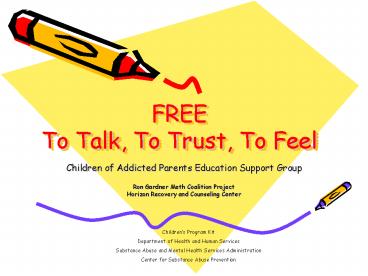FREE To Talk, To Trust, To Feel - PowerPoint PPT Presentation
1 / 13
Title:
FREE To Talk, To Trust, To Feel
Description:
Family members develop unhealthy ways of communicating with each other and ... NACoA (National Association for Children of Alcoholics) 11426 Rockville Pike, Suite 100 ... – PowerPoint PPT presentation
Number of Views:33
Avg rating:3.0/5.0
Title: FREE To Talk, To Trust, To Feel
1
FREETo Talk, To Trust, To Feel
- Children of Addicted Parents Education Support
Group - Ron Gardner Meth Coalition Project
- Horizon Recovery and Counseling Center
Childrens Program Kit Department of Health and
Human Services Substance Abuse and Mental Health
Services Administration Center for Substance
Abuse Prevention
2
Addiction in the Family Affects Everyone
- Family members develop unhealthy ways of
communicating with each other and coping with
addiction. - Rules in Addicted Families
- Dont Talk
- Dont Trust
- Dont Feel
3
Children of Addicted Parents
- Why Special Emphasis?
- Numbers 1 in 4 children is affected by alcohol
abuse or alcoholism in the family many are also
hurt by parental drug use. - Developmental impact is both social and emotional
- Early Intervention
- Prevention of Mental Health Problems COAs are
at increased risk for depression and anxiety
disorders - Prevention of Substance Abuse Problems COAs
have increased environmental and genetic risks. - Relapse Prevention Reduction of stress in the
family
4
People Outside of the Family Can Make a Difference
- When treatment programs provide educational
support groups for school-age children - Family stress is reduced.
- Childrens sense of stigma and shame is reduced.
- Family Recovery is enhanced.
- Treatment outcomes improve.
5
End Broken Promises, Mend Broken Hearts Video
- This video provides
- A rationale for addressing the needs of children
with addicted parents as well as information
about educational support groups and appropriate
and effective settings for them. - Messages from children and parents who have
benefited from support groups. - Messages from prevention, treatment, and school
professionals who have provided educational
support groups for children of parents in
treatment.
6
Critical Information for Children of Parents in
Treatment
- Childrens educational and support programs
provide education about addictions to give
children a framework for what they are
experiencing as well as - Information about addiction as a family disease.
- Information on community-based support, such as
Alateen and school-based student assistance
programs. - Clarification about and validation of their
experiences. - Resources for them to learn, talk and play, and
get their questions answered. - Information to learn that recovery is a process.
- Information on the resilience they have developed
as a result of their experiences. - Reassurance that the child needs and deserves
support and help.
7
Messages That Group Offers for Children
- Youre not alone there are lots of kids living
in families like yours. - Its not your fault.
- You deserve help, and there is help for you.
- Addiction is a disease
- Its okay to share your feelings with safe people.
8
Messages for Parents
- Give your children the gift you never got.
- Children can recover too.
- Helping your children will help you.
9
Group Work Is the Preferred Strategy
- Groups
- Validate perceptions and interpretations.
- Absolve children of blame and help them gain
perspective. - Help separate parent from behavior.
- Increase the likelihood of breaking denial.
- Provide safety and protection.
- Build trust in social situations.
- Provide opportunities for group validation.
- Allow kids to try out new approaches to old
problems. - Teach them skills for self-care.
- Offer children hope and help to cope.
- Children learn theyre not alone and experience
healthy social interactions.
10
Differences Between Educational Support and
Therapy Groups
- Educational Support Groups
- Focus on life skills/coping skills
- Education
- Support/safety net
- Educational goals and objectives are achieved
through curriculum-based content and activities - Building protective factors
- Conducted by trained facilitators who are caring
knowledgeable about child development and
specific issues and have health to give. - LOVEE driven Listen, Observe, Validate,
Education, Empower - Time limited 6-12 weeks.
- Therapy Groups
- Solve a personal problem
- Resolution
- May be supportive, but also contain confrontation
and probing - Individualized treatment plans, use of
therapeutic activities however, the process is
always more important than content - Probing addressing impact of risk factors may
focus later on protective factors - Conducted by trained therapists
- Driven by psychological theory and diagnosis
- Length of treatment determined by treatment
process and patients progress, or insurance
coverage.
11
Free To Talk, To Trust, To Feel Materials
- Notes to therapists
- Helpful information for Parents in Families
affected by addiction - Program flyers
- Referral Procedures and Forms
12
Resources
- (CSAP) Center for Substance Abuse Prevention
- Rockwall II Building
- 5600 Fishers Lane, Room 900
- Rockville, MD 20857
- (301) 443-0305
- www.samhsa.gov/csap
- CSAT (Center for Substance Abuse Treatment
- Rockwall II Building
- 5600 Fishers Lane, Room 600
- Rockville, MD 20857
- (301) 443-5052
- www.samsha.gov/scat
- NACoA (National Association for Children of
Alcoholics) - 11426 Rockville Pike, Suite 100
- (301) 468-0985 or
- (888) 55-4COAS (2627)
- (301) 468-0987 ( fax)
- www.nacoa.org
13
Free To Talk, To Trust, To Feel
- Ron Gardner Meth Coalition Project
- Betty Vertin, Director
- 402-462-7177
- team_at_riseabovemeth.org
- www.riseabovemeth.org































